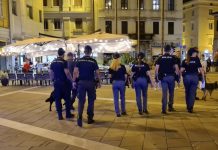by Nina Vaclavikova
Interview: Caterina de Gavardo, Trieste councilor for city security policies
Trieste’s municipal government has introduced a series of proposed revisions to the city’s Urban Police Regulations, aiming to address changing community needs, increased tourism, and public concerns about safety and civility in shared spaces.
At a press conference on Tuesday, Caterina de Gavardo, councilor for city security policies, outlined the amendments approved by the Municipal Executive Committee the previous day. The proposals, she said, respond to evolving urban dynamics and will undergo review by district councils before being submitted to the full City Council for debate and potential approval.
“The regulation is a dynamic instrument that must evolve alongside the city,” de Gavardo said, noting that the current framework dates to 2017, with updates in 2018 and 2023. “Our goal is to make it clearer and more effective, enabling local police to act more decisively in situations that impact quality of life.”
Citizen Volunteers and “Neighborhood Control”
One of the most notable changes would formally allow for neighborhood watch initiatives, described as “active citizenship” measures. The plan, proposed by district councilor Ignazio Vania and inspired by resident requests, foresees volunteers who act as “sensors” in the community — not replacing law enforcement but maintaining close contact with authorities to report concerns.
Should the city activate the program, it would be governed by a protocol with the Prefecture and Police Headquarters, including training for volunteers and clearly defined responsibilities. “These individuals will not have operational powers,” de Gavardo emphasized. “They will simply be community points of contact.”
Trieste Local Police Commander Walter Milocchi noted that the city would be “among the pioneers” in Italy in formally adopting such a system.
Decorum Rules and Ban on Key Lockboxes
With tourism rising sharply in recent years, the city is also seeking to refine rules on public decorum. The amendments would explicitly prohibit walking bare-chested in the city center and clarify the ban on exposing nudity in public spaces. Councillors Salvatore Porro and Massimo Codarin promoted these measures.
Another provision would prohibit affixing key lockboxes — often used for short-term rentals — to public fixtures, aligning them with existing bans on padlocks and similar devices. Officials say the practice has become increasingly common as visitor accommodations have spread.
Expanded “Urban Ban” Zones
The city also plans to widen the areas where the D.A.C.U.R., known as the Daspo urbano, may be enforced. The measure allows authorities to temporarily bar individuals who commit acts deemed contrary to public decency or safety from specific zones.
The expansion — supported by the mayor — would extend coverage from the waterfront stretch between Ausonia and Piazza Libertà to include areas up to Via Grilz and the Bivio, as well as the Barcola pine grove, a popular seaside promenade previously outside the ban perimeter. Violators may be ordered to leave for up to 48 hours; repeat offenders can face bans of six months to a year.
Milocchi said the update “uniforms and enlarges” enforcement areas to better protect high-traffic zones.
Next Steps
The proposals will now be circulated among district councils before returning to the full City Council for review.
Framing the changes as a balance between urban vitality and community standards, de Gavardo said the revisions are intended to ensure that the city’s growth — particularly in tourism — continues “without becoming a source of friction,” and that Trieste remains “a livable, orderly environment for residents and visitors alike.”































